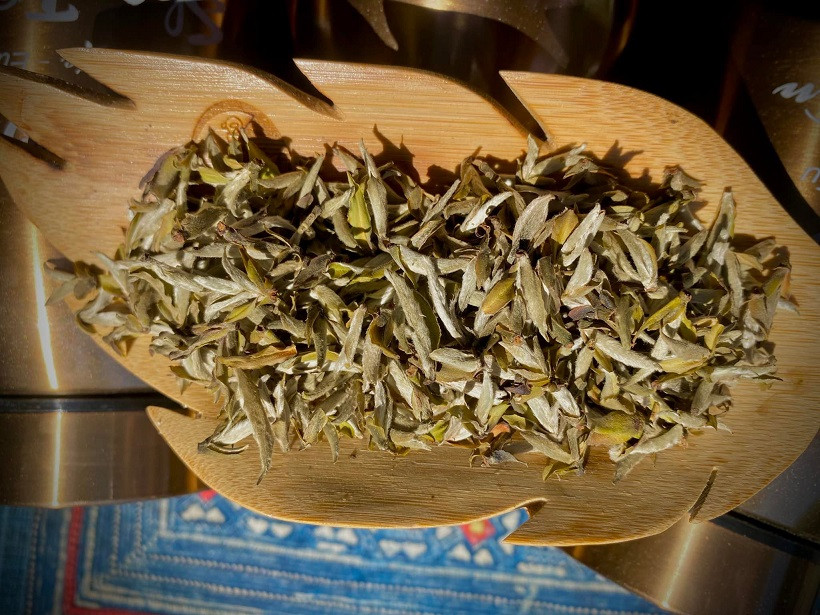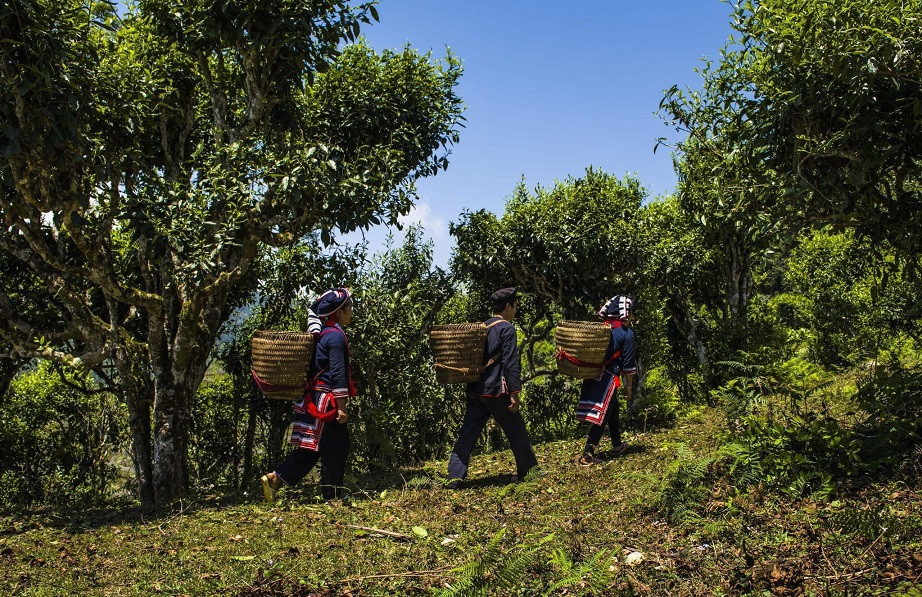
With this production chain, Phin Ho Tea Processing Cooperative in Thong Nguyen commune in Hoang Su Phi district, Ha Giang province provides hundreds of tons of finished tea to the market, earning nearly 10 billion VND/year, helping many Red Dao ethnic households escape poverty.
From high mountains, Fin Hon tea reaches the world
Thong Nguyen commune has a relatively large tea growing area in Hoang Su Phi district. In this mountainous area, Shan Tuyet tea has been around for a long time, attached to the lives of the Dao people from generation to generation.
Shan Tuyet tea trees live at a height of thousands of meters on a mountain range with a cool climate all year round. Therefore, the tea here has a special delicious and pure taste. However, people mainly grow and exploit tea in a traditional, fragmented way, so their earnings from tea is low. Sometimes their dry tea was priced only 10,000-15,000 VND/kg and it was still difficult for them to sell their products.
Hunt by poverty, many people had to cut down ancient tea trees that were hundreds of years old to switch to growing corn and rice.
In that situation, Mr. Ly Choi Nhan - Vice Chairman of Thong Nguyen Commune People's Committee - discussed with local people to find a way to save the Shan Tuyet tea trees. After many ups and downs, in 2008 the Phin Ho Tea Processing Cooperative was established with the goal of linking tea growing households to produce large-scale goods. At that time, the cooperative had only a few hundred of ancient tea trees.
In the early days of establishment, the cooperative mainly purchased fresh tea leaves from member households, processed them into green tea using traditional methods and then sold them to the market. The source of input materials was limited to about 30 hectares of tea belonging to member families, so the output was small. Product packaging and labels were very simple while the management apparatus still lacked experience. Therefore, in the first 3 years of operation, the cooperative's revenue only reached about 500 million VND/year.
In 2017, the cooperative invested in innovating the entire production technology line. One year later, for the first time, the cooperative exported over 20 tons of dry tea to Taiwan (China), marking the rise of the Fin Ho Tra brand.
Director of the Phin Ho Tea Processing Cooperative, Trieu Ta Hin, said that in order to enhance the value of ancient indigenous tea trees, in recent years the cooperative has expanded its production scale and expanded its raw material areas. The cooperative associates with 410 tea growing households in Thong Nguyen, Nam Ty, Tung San communes... These are the material areas that meet European organic standards.
Besides, the cooperative continues to innovate production technology lines and diversify products; regularly organize training on tea planting, care, harvesting and processing techniques for farmers, ensuring organic standards to maintain product quality; promote building and promoting the Fin Ho Tra tea brand.
The cooperative currently has 5 different product lines under the Fin Ho Tra brand including: Green tea, Pink tea, Black tea, White tea, Tien tea. According to Mr. Hin, Fin Ho tea brand products are made from the youngest tea buds of ancient Shan Tuyet tea trees in tea areas certified organic by the European Union in 2015.
In 2021, two products of the cooperative, Green Tea 100gr box and Black tea 100gr box, achieved national 5-star OCOP product certification (One Commune One Product Program). These are also the first two products of Ha Giang province to achieve 5-star OCOP and are the pride of Red Dao ethnic households.
Along with product quality, tea is also packaged in bags and boxes with eye-catching packaging aimed at the gift segment. A 1kg of tea is priced several million VND, even tens of million VND. For example, the EU Organic white tea bud product is priced 500,000 VND/bag of 50 grams (10 million VND/kg); Dragon Claw tea is priced 700,000 VND/bag of 200 grams (3.5 million VND/kg); Black tea buds is priced 500,000 VND/package of 100 grams (5 million VND/kg).
The cooperative’s products are distributed in many supermarket systems, on major e-commerce platforms in Vietnam, and exported to high-end markets such as Taiwan, Japan, Europe...

The "green gold" of the Red Dao people
The cooperative is collaborating with 410 households to produce tea on a scale of 210 hectares, of which 138 hectares are raw material areas certified according to European organic standards. Each year, it supplies about 90-100 tons of finished dried tea to the market.
According to Mr. Trieu Ta Hin, in recent years, the cooperative has gradually improved product quality and created trust with consumers. From there, it helps cooperative members improve productivity, increase income from tea trees and at the same time increase the cooperative's revenue significantly.
From a poor mountainous village, the lives of people in Phin Ho have changed thanks to the tea making profession. The village no longer has poor households. Some families work hard so they have become rich.
As one of the households growing the most tea in Phin Ho village (Thong Nguyen), Mr. Ly Van Lin said that since joining the cooperative, tea prices are no longer pressured by traders. Tea products are recognized as 5-star OCOP, helping the price of raw materials to be higher than before. Therefore, every year his family earns more than 100 million from the native Shan Tuyet tea tree.
Ms. Trieu Mui Nghinh's family has 2 hectares of Shan Tuyet tea, including tea trees up to 300 years old. In the past, tea was just a drink for the Red Dao people to welcome guests. The rest was sold for money, but the price was little.
Now, 1kg of specialty tea can help Ms. Nghinh exchange a quintal of rice. In particular, the ancient tea trees helped her and many people in the village buy buffaloes, cows, televisions, motorbikes... Life has turned from poverty to prosperity.
This is the reason many people consider Shan Tuyet tea as the "green gold" of the Red Dao people in Hoang Su Phi.
The Phin Ho Tea Processing Cooperative is not only a typical example of good production and business but also initially develops the model "My Shan Tuyet tea tree". That is, customers can buy the entire tea tree from the cooperative for 1 year or many years.
After the customer finalizes the purchase, the cooperative and the farmers will take care of and harvest products from the tea tree according to the best standards and then process and package the products under their own brand. The product will be delivered to customers who have previously ordered the tea tree. All purchased tea trees are marked on Google map so the product's origin can always be traced easily.
The cooperative's leaders said that this is a direction to help increase the value of Shan Tuyet tea trees, while spreading the brand to consumers across the country.